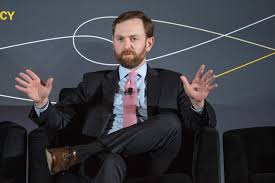President-elect Donald J. Trump recently announced Andrew Ferguson as the new head of the Federal Trade Commission cFTCc, a move that signals a shift in the agency’s approach towards regulating powerful American companies. Mr. Ferguson, a current Republican member of the agency, is set to replace Lina Khan, known for her aggressive stance on challenging mergers and the dominance of big tech firms.
Mr. Ferguson's appointment comes at a critical juncture as concerns over antitrust enforcement and the influence of technology giants continue to dominate discussions. His background as a veteran Congressional aide and former Supreme Court clerk brings a wealth of legal expertise to the role. Notably, he has reportedly aligned himself with Mr. Trump's vision for the FTC, advocating for a more lenient approach towards most American companies, with a focus on maintaining scrutiny over major tech platforms.
The announcement of Mr. Ferguson's appointment has generated significant interest and speculation about the future direction of the FTC under the incoming administration. With the agency playing a key role in consumer protection and antitrust enforcement, the choice of leadership holds considerable weight in shaping policies that impact businesses and consumers alike.
It is expected that Mr. Ferguson will prioritize a reevaluation of the FTC's agenda, particularly with regards to artificial intelligence regulation and merger standards. By signaling a departure from some of Ms. Khan's initiatives, Mr. Ferguson aims to strike a balance between promoting competition and fostering business growth in the market.
However, one of the most crucial aspects of Mr. Ferguson's appointment lies in his stance on expanding regulatory oversight to include social media platforms that are perceived to stifle conservative viewpoints. This move aligns with broader efforts by the Trump administration to address concerns over censorship and political bias on online platforms, though it may raise constitutional challenges related to free speech protections.
As discussions around Mr. Ferguson's leadership unfold, stakeholders are closely monitoring how his tenure will shape the FTC's enforcement priorities and regulatory stance across various sectors. With the tech industry undergoing rapid evolution and facing increasing scrutiny globally, the decisions made under Mr. Ferguson's leadership will have far-reaching implications for competition, innovation, and consumer welfare in the digital age.
In conclusion, the appointment of Andrew Ferguson as the head of the FTC represents a strategic move by the incoming administration to redefine the agency's regulatory approach, particularly in the context of antitrust enforcement and the oversight of tech giants. As Mr. Ferguson steps into this pivotal role, all eyes will be on how he navigates the complex landscape of competition policy and balances the interests of businesses, consumers, and broader societal concerns in the ever-evolving digital economy.

